10 Essential Tips for Growing Healthy Herbs at Home
Discover 10 must-know tips for growing healthy herbs at home. Perfect for beginners—boost flavor, prevent pests, and keep your plants thriving.
GROW & CARE


Want to grow your own herbs but not sure where to start? Whether you’re working with a backyard garden or a sunny kitchen windowsill, herbs are some of the easiest plants to care for—if you know the basics.
Here are 10 simple yet powerful tips to help your herbs thrive, stay flavorful, and look lush all year long. 🌱
1. Choose Herbs That Match Your Climate
Not all herbs love the same environment.
Mediterranean herbs like rosemary, thyme, and oregano prefer dry, sunny conditions.
Leafy herbs like basil, parsley, and cilantro prefer more moisture and cooler temps.
Know your zone, and choose accordingly!
2. Don’t Overwater—Herbs Hate Soggy Feet
Most herbs prefer to dry out slightly between waterings.
Tip: Stick your finger 1 inch into the soil—if it’s dry, it’s time to water.
3. Use the Right Potting Mix
Standard garden soil can suffocate herbs in containers.
Use a well-draining potting mix, and add perlite or coarse sand for better aeration.
4. Give Them at Least 6 Hours of Sunlight
Herbs like full sun, especially the woody ones like sage and oregano.
If growing indoors, place near a south-facing window or supplement with a grow light.
5. Pinch, Don’t Just Pluck
Regular pinching encourages herbs to grow bushier and prevents early flowering (bolting).
Always trim above a leaf node to trigger branching.
6. Harvest Frequently
Don’t be shy—frequent harvesting helps herbs stay productive.
Remove no more than ⅓ of the plant at once, and always from the outer leaves first.
7. Avoid Overcrowding
Plants need airflow to prevent mildew and fungal issues.
Leave space between herbs—about 6–10 inches apart in containers or beds.
8. Watch for Pests
Aphids, spider mites, and whiteflies love herbs too.
Use neem oil or insecticidal soap if you notice discoloration, curling leaves, or webs.
9. Feed Lightly
Most herbs don’t need much fertilizer.
Use a diluted organic liquid feed once a month during the growing season for a gentle boost.
10. Rotate and Refresh Pots Annually
If you’re growing in containers, change soil every season to avoid disease buildup.
Rotate your herbs to prevent them from getting leggy toward the light.
